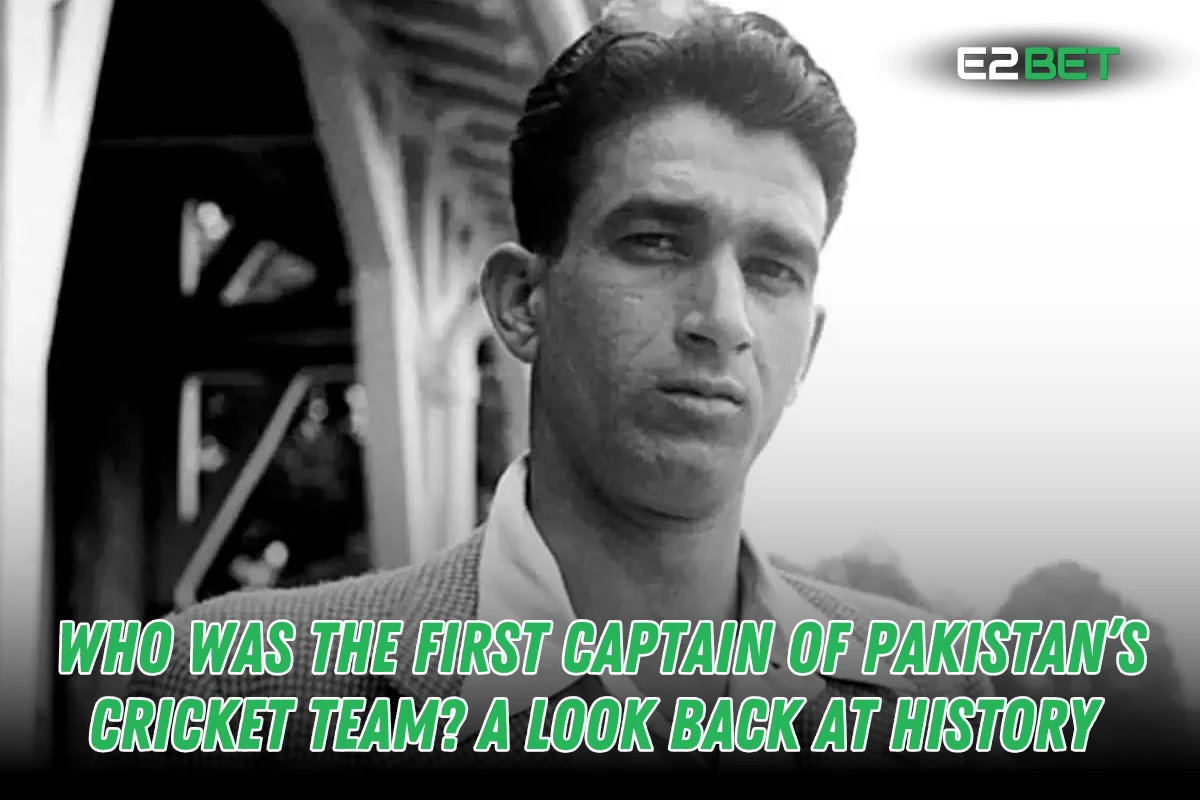Pakistan’s cricket history is filled with remarkable moments, but it all started with Pakistan’s first cricket captain leading the team onto the field. The role of a cricket captain is crucial in shaping a squad, instilling discipline, and building a winning mentality. But who was the First Captain of Pakistan Cricket Team? Let’s explore the story of Abdul Hafeez Kardar, a name often referred to as the father of Pakistan cricket.
Birth of Pakistan Cricket
After Pakistan gained independence in 1947, cricket in Pakistan was still in its infancy. The Pakistan Cricket Board (PCB) was established to develop and promote the sport, but the team faced numerous challenges. Unlike established cricketing nations, Pakistan lacked infrastructure, experience, and international recognition.
However, the cricketing world recognized Pakistan’s potential, and in 1952, the team was granted Test status by the ICC, marking the beginning of a historic journey.
Who Was the First Captain of Pakistan’s Cricket Team?
The honor of leading Pakistan’s cricket team in its first international match went to Abdul Hafeez Kardar. He wasn’t just a cricketer; he was a visionary leader who played a key role in shaping the Pakistan cricket team. Kardar had previously played for India’s cricket team before partition, which gave him valuable experience at the international level.
Abdul Hafeez Kardar: The Pioneer Leader
Early Life and Cricket Journey
Born on January 17, 1925, in Lahore, Kardar’s cricket career began before the creation of Pakistan. He was among the few players to represent both India and Pakistan in Test cricket. After independence, he chose to play for Pakistan’s first cricket team, becoming its natural leader.
How He Became the First Captain
With his strong cricketing background and leadership skills, Kardar was the perfect choice to lead Pakistan in its first-ever Test match. His appointment as Pakistan’s first cricket captain was crucial in setting the tone for the future.

Pakistan’s First International Cricket Match
When and Where Was the First Match Played?
Pakistan played its first Test match against India in October 1952 at Feroz Shah Kotla, Delhi. This match was significant as it marked Pakistan’s official entry into international cricket.
Match Summary
- Opponent: India
- Venue: Feroz Shah Kotla, Delhi
- Result: Pakistan lost the match, but it was a major learning experience for the team.
Challenges Faced by Abdul Hafeez Kardar
Leading a newly formed Pakistan cricket team was no easy task. Kardar had to deal with:
- Lack of international exposure among players
- Limited financial and training resources
- The absence of a structured domestic cricket system
Despite these difficulties, Kardar remained determined to build a competitive team.
Pakistan’s First Test Victory Under Kardar
Pakistan recorded its first Test victory in 1954 against England at The Oval. This was a historic achievement that proved Pakistan could compete against the best teams in the world.
Leadership Style of Abdul Hafeez Kardar
Kardar was known for his aggressive and strategic leadership. He believed in discipline and teamwork, setting a foundation that later captains like Imran Khan and Wasim Akram would follow. His ability to inspire his players helped Pakistan’s cricket team gain respect in the international arena.
Legacy of Abdul Hafeez Kardar
Even after retiring from cricket, Kardar continued to contribute to Pakistan cricket. He became an administrator, helping strengthen the Pakistan Cricket Board (PCB) and promoting cricket in Pakistan.
Comparison With Later Captains
While captains like Imran Khan, Wasim Akram, and Babar Azam have achieved great success, Abdul Hafeez Kardar’s leadership remains unique. He laid the foundation for Pakistan’s cricketing future, making it possible for later captains to build on his legacy.
Pakistan Cricket’s Growth After Kardar
Since Kardar’s time, Pakistan cricket has grown tremendously:
- Winning the 1992 Cricket World Cup under Imran Khan
- Consistently producing world-class cricketers like Wasim Akram, Waqar Younis, and Babar Azam
- Becoming a competitive force in T20 cricket and other formats
How Pakistan Honors Its First Captain Today
Kardar’s contributions to Pakistan cricket have not been forgotten. He has been inducted into the PCB Hall of Fame, and cricket academies in Pakistan continue to honor his legacy.
Interesting Facts About Abdul Hafeez Kardar
- He was one of the few cricketers to play for both India and Pakistan.
- Kardar later served as Pakistan’s Minister for Youth Affairs and Sports.
- He played a major role in shaping Pakistan’s cricket administration.
Conclusion
Abdul Hafeez Kardar was more than just Pakistan’s first cricket captain—he was a true pioneer. His leadership, vision, and passion for the game helped lay the foundation for Pakistan cricket’s future success. Today, Pakistan cricket fans remember him as a legend who shaped the sport in the country.
FAQs
Q1. Who was the first captain of Pakistan’s ODI team?
Ans: Intikhab Alam was the first ODI captain of the Pakistan cricket team, leading the side in 1973.
Q2. What was Abdul Hafeez Kardar’s greatest achievement?
Ans: His biggest achievement was leading Pakistan to its first Test victory against England in 1954.
Q3. How did he influence modern Pakistani cricket?
Ans: Kardar’s leadership style and contributions to PCB helped establish a strong cricketing structure in Pakistan.
Q4. When did Pakistan win its first-ever Test match?
Ans: Pakistan won its first Test match in 1954 against England at The Oval.
Q5. Why is Kardar called the father of Pakistan cricket?
Ans: He was Pakistan’s first cricket captain, built the foundation of Pakistan cricket, and later contributed as an administrator.